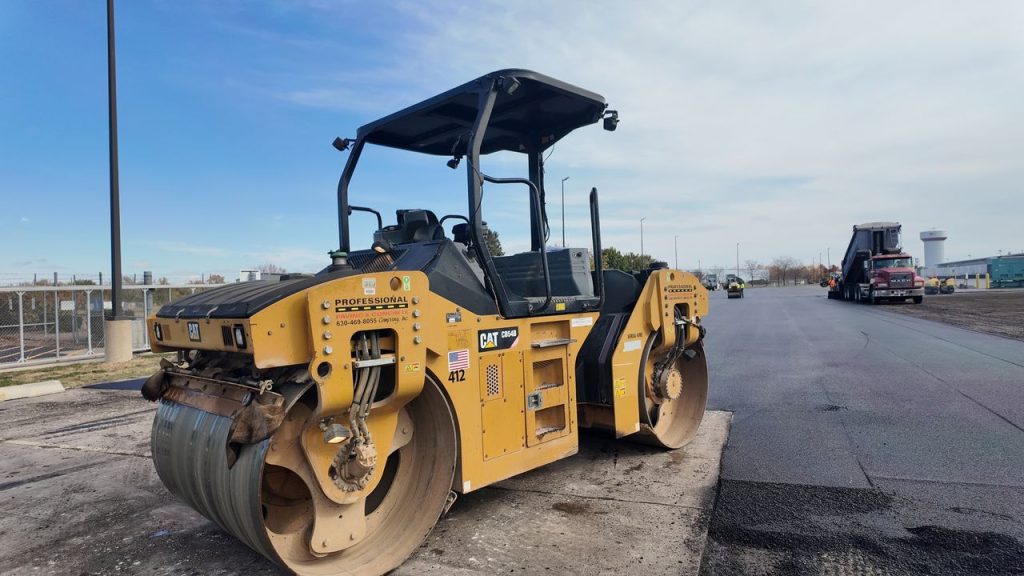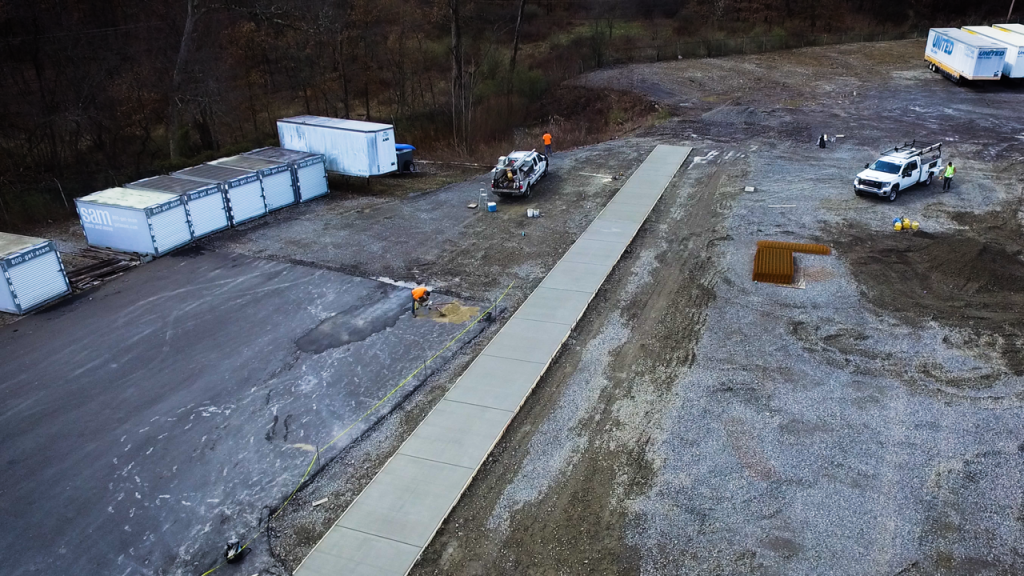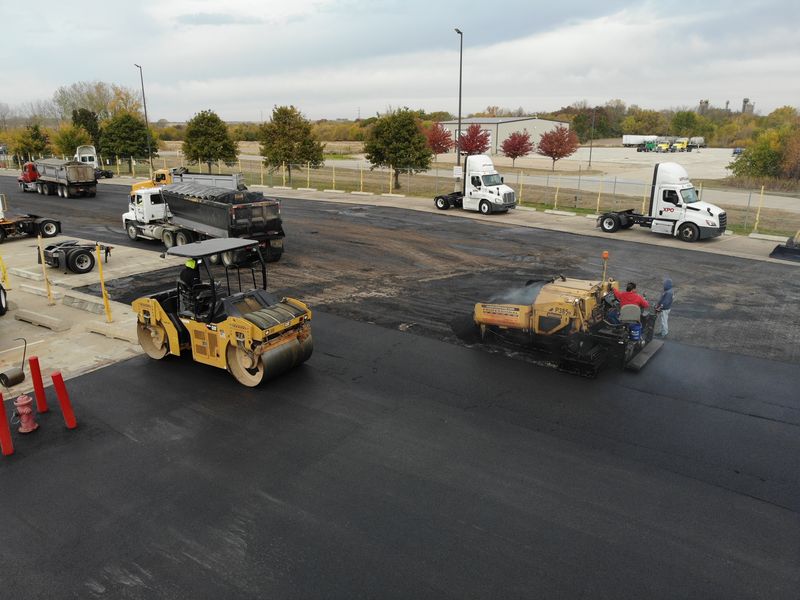Ever walk through a parking lot full of cracks and wonder what went wrong? Maybe you’ve been there yourself, you approved a paving project, the asphalt looked great for a few months, and then boom; potholes, drainage problems, and costly repairs: commercial asphalt paving mistakes are frequently the cause.
That’s because commercial asphalt paving isn’t just about pouring blacktop and hoping it holds up. There’s a method. A science. And when shortcuts get taken or mistakes are made, you pay the price. At The Pavement Group, we’ve seen it all, from poor prep work in Pittsburgh to drainage disasters in Dallas. This guide will walk you through the most common commercial paving mistakes and how you can dodge them.
Why Commercial Asphalt Paving Projects Fail
Sometimes it’s not obvious right away. The lot looks great at first. But a year later? Cracks show up. Water pools in weird places. The surface starts crumbling. Here’s why commercial asphalt paving mistakes happens:
1. Ignoring Proper Site Preparation
This is the number one killer of long-lasting asphalt. If the base layer isn’t prepped and compacted correctly, your entire surface will eventually crack and fail. It’s like building a house on sand. Looks nice. Doesn’t last.
2. Poor Drainage Planning
Water is asphalt’s worst enemy. If your paving company didn’t plan for proper drainage, you’ll end up with standing water that breaks down the material. That’s how potholes form, and they spread fast in freeze-thaw climates like Chicago or Cleveland.
3. Using the Wrong Asphalt Mix
Not all asphalt is created equal. You need a mix that matches your region’s weather and traffic patterns. What works in Phoenix won’t hold up in Buffalo. A lot of contractors cut corners here to save money.
4. Skipping the Sealcoating
Skipping sealcoating is like never waxing your car. Sure, it runs, but it gets beat up fast. Sealcoating protects your asphalt from oil, UV rays, and water damage. Without it, your lot will deteriorate faster than expected.
5. Bad Timing or Weather Conditions
Asphalt needs certain weather to cure properly. If it’s laid down during rain or extreme cold, it won’t bond or settle right. We’ve had to redo full jobs because another contractor rushed the process.
How to Avoid Commercial Paving Mistakes
Now that you know what goes wrong, let’s talk about how to make it right from commercial asphalt paving mistakes.
1. Work With a Reputable Commercial Paving Company
This one’s huge. A lot of the mistakes we just talked about? They don’t happen when you hire pros who actually know what they’re doing. The Pavement Group has managed commercial projects across the US with crews who understand regional codes, climate conditions, and best practices, so nothing gets overlooked.
2. Get a Thorough Site Inspection First
Before a single truck rolls in, your paving contractor should inspect your site’s base, drainage, and layout. If they skip this step, that’s a red flag. A detailed inspection helps prevent future problems like shifting, water damage, and premature cracking.
3. Choose the Right Asphalt Mix for Your Region
Don’t go with generic materials. The right mix depends on your region’s climate and the kind of traffic your lot will handle. In the South, heat resistance matters. In the Northeast, your mix needs to stand up to salt and freeze-thaw cycles.
4. Don’t Rush the Project
Everyone wants the job done fast. But quality paving takes time. Rushing leads to uneven surfaces, improper curing, and long-term problems. Trust the process and let the experts do it right the first time.
5. Plan for Maintenance From Day One
A maintenance plan is not optional. Crack sealing, regular sealcoating, and routine inspections extend the life of your asphalt by years. At The Pavement Group, we build maintenance right into your contract so you’re covered.
Feedback From a Commercial Property Manager
“I run a multi-property portfolio across Ohio and Kentucky, and we’ve had our share of paving nightmares in the past. But once we started working with The Pavement Group, things changed. They walked our sites, gave us honest timelines and budgets, and delivered on every promise. No last-minute surprises. No poor workmanship. Just great results that are still holding strong.”
— Jason H., Commercial Property Manager, Cincinnati, OH
The Pavement Group Difference
We’re not just paving parking lots. We’re building relationships, protecting property value, and helping commercial property managers look like rockstars to their tenants and owners.
Why our clients trust us:
- Full-service site evaluations
- Regional crews across the US
- Commercial-only paving expertise
- Honest pricing and clear communication
- 24/7 project visibility and reporting tools
Whether you’re repaving an entire mall lot or just need a few repairs at a logistics center, we’ve got the right team for the job.
Let’s Fix It Before It Cracks. Let’s Build Something That Lasts.
If you’re not sure what condition your asphalt is in, or you just want a second opinion before signing a big contract, give us a shout. We’ll walk your property, identify potential risks, and create a smart, cost-effective paving plan that avoids common pitfalls. No pressure. No gimmicks. Just experienced advice from people who care about your pavement as much as you do. Book a free site assessment with The Pavement Group today. Let’s pave the smart way and avoid commercial asphalt paving mistakes. We’ve got your back, coast to coast.
Frequently Asked Questions
1. What’s the most common commercial paving mistake?
Improper site preparation is the most common and damaging mistake. If the base layer isn’t compacted or graded correctly, the asphalt on top will fail. It leads to cracks, water pooling, and costly repairs down the line.
2. Can poor drainage really ruin a new parking lot?
Yes, poor drainage causes standing water, which weakens the asphalt and shortens its lifespan. It can also lead to dangerous ice patches in colder climates. A good paving company will install proper grading and catch basins to prevent this.
3. How do I know if my contractor is using the right asphalt mix?
Ask them directly what type of mix they’re using and why it’s appropriate for your location. Each region has different needs depending on weather and usage. A qualified contractor will explain their material choices in detail.
4. Does weather matter when installing asphalt?
Absolutely. Asphalt should only be installed in dry conditions and at the right temperature—usually above 50°F. Bad weather can prevent the mix from bonding properly and lead to early failure.
5. What is sealcoating and why is it important?
Sealcoating is a protective layer that shields asphalt from sunlight, water, oil, and chemical spills. It helps maintain the look and integrity of your pavement. Without it, your lot can age faster and develop surface damage quickly.
6. How often should I maintain commercial asphalt?
Routine inspections should happen yearly. Crack sealing and sealcoating are typically needed every 2 to 3 years. Regular maintenance extends the lifespan of your pavement by 5 to 10 years or more.
7. Can cutting costs on asphalt quality really hurt my property?
Yes, low-cost materials often fail to hold up under traffic or weather conditions. Cheap mixes may not have the proper binding agents or aggregates. You might save upfront but end up paying far more in repairs.
8. What are signs my asphalt is failing?
Look for alligator cracking, potholes, faded coloring, and standing water. These are signs that your pavement is breaking down or was installed poorly. Early repair can prevent complete replacement.
9. Should I get a second opinion on a paving quote?
Definitely. Some contractors underbid and then cut corners. Others overcharge. It’s smart to get multiple quotes and choose a company that explains their process clearly.
10. How do I avoid being scammed by a paving company?
Avoid companies that don’t provide a physical address or want full payment upfront. Look for a detailed contract and references from other commercial clients. Reputable companies like The Pavement Group are transparent from start to finish.


